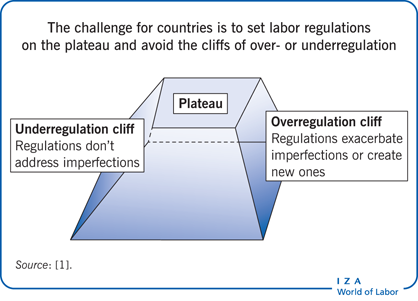Elevator pitch
Governments regulate employment to protect workers and to improve labor market efficiency. However, employment regulations can be controversial, often complicated by opposing ideological views. Thus, it is important for policymakers in developing countries to base decisions on empirical evidence of the impacts of these regulations. The majority of the evidence suggests that most countries have set their regulations in the appropriate range. But it can be costly when countries either overregulate or underregulate their labor market.
Key findings
Pros
Labor market regulations can improve the employment situation of vulnerable workers.
Concerns about large negative effects on employment and productivity are not substantiated in most countries.
Any negative effects can be minimized if regulations are consistent with good practices in the specific country context and if compliance and interactions with other regulations and institutions are considered.
Careful empirical monitoring and evaluation can identify the effects of regulations.
Cons
Overly stringent regulations can impede job creation and hurt the workers they are intended to help.
Underregulation does not address the problems of worker protection and inadequate information.
It can be difficult to monitor the effects of regulations if labor market information is inadequate.
Decisions on labor market regulations are often dictated by political concerns rather than evidence.
